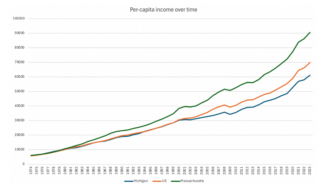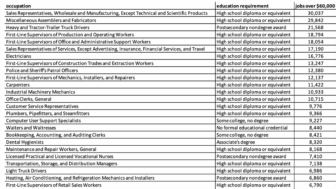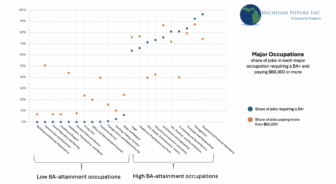
As a culture we celebrate small business. There are many reasons why we should. It certainly is one of the paths to economic success for those who create a long term successful enterprise. And small business are a source of innovation and amenities that make our communities better places to live.
But our celebration of small business is misplaced when it comes to their role in creating a prosperous state and regional economy. Conventional wisdom has it that small business is the engine of the economy. The reality is quite different. The engine of new jobs are the small proportion of startups who grow big. Think Google or Quicken Loans, not the new neighborhood restaurant. There are far more of the latter that the former.
And, maybe most importantly, by and large small business is a low-wage employer. They are a major contributor to the core challenge facing the Michigan and national economy of way too many low-wage jobs.
The Michigan Association of United Ways ALICE report provides the details. They found:
… Small businesses employed just over half of the private-sector workforce in Michigan. The smallest firms — those with fewer than 20 people — accounted for the largest share of small-business employment.
… The wages of employees in the smallest firms are significantly lower than wages in larger firms. While average wages in Michigan have been increasing faster than the 12 percent national rate of inflation, for many employees, wages in the state have not kept pace with the 27 percent increase in the cost of the family Household Survival Budget.
From 2010 to 2017, workers in Michigan firms with fewer than 20 employees saw their wages rise by 16 percent to $35,071 (if full time, year-round). Workers in companies with 20 to 49 employees saw their annual wages increase by 14 percent to $39,701, and wages for workers in companies with 50 to 249 employees increased by 16 percent to $45,057.
Employees in the largest firms started with higher wages and saw an increase in wages: Those working in firms with 250 to 499 employees saw their wages increase by 13 percent to $47,057, and the wages of those working in firms with 500 or more employees increased by 19 percent to $55,311.
So small business in Michigan is a major contributor to the high and growing proportion of Michigan households who cannot pay for basic necessities. As we explored in a previous post, in 2017 43 percent of Michigan households were unable to pay for necessities. Up six percent from 2010 when the Michigan economy was just starting to grow after the Great Recession.
How can that be? In a strong and growing economy more Michigan households can’t afford to pay for housing, child care, food, transportation, health care, a cell phone and taxes.
The simple answer is too many of us work in low-paying jobs with little or no benefits. As the ALICE report notes: “Low-wage jobs dominate the employment landscape, with 61 percent of all jobs in Michigan paying less than $20 per hour.” More exact for lower-paid workers wages and benefits are growing slower than the cost of paying for basic necessities. Turns out Michigan small business are a major contributor to this low-wage economy.
So as a culture we probably should start to celebrate those employers who provide high-wage jobs, no matter their size. Rather than our current view that small enterprises are good and large ones not so much. What Michigan needs most are far more good-paying jobs. Employers that provide more and more of those are the real engine of recreating a high-prosperity Michigan.







